
What is the Difference between Data Science and Data Engineering?
Mar 07, 2025 6 Min Read 4554 Views
(Last Updated)
Data is ruling the world these days and India is no exception. Just like the rest of the world, we’re seeing a massive jump in the demand for data, and with that data science and data engineering roles. And this isn’t just a passing trend.
Though they both sound similar, on a core level, their difference lies in their roles and responsibilities, skills sets and even educational qualifications differ from one another. That is why it is important to understand both of their differences.
If you’ve been scratching your head, willing to understand the difference between data science and data engineering, or wondering which path might be the perfect fit for you, this blog post is for you. Let’s get started.
Table of contents
- What is Data Science and Data Engineering?
- Is There a Difference Between Data Science and Data Engineering?
- Data Science vs. Data Engineering: Roles and Responsibilities
- What Does a Data Scientist Do?
- What Does a Data Engineer Do?
- Data Science vs. Data Engineering: Skillsets Required
- Data Scientist vs. Data Engineer: Salary Differences
- Data Science vs. Data Engineering: Career Paths
- What's a Typical Career Path for a Data Scientist?
- What's a Typical Career Path for a Data Engineer?
- General Comparison Between Data Science and Data Engineering
- Can a Data Engineer Become a Data Scientist or Vice-Versa?
- From Data Engineer to Data Scientist:
- From Data Scientist to Data Engineer:
- How to Make the Transition:
- Conclusion
- FAQs
- Is data science the same as data engineering?
- Which is better, data science or data engineering?
- Is data engineering harder than data science?
- What is the future of data science and data engineering?
- How much do data science and data engineering freshers make in India?
What is Data Science and Data Engineering?
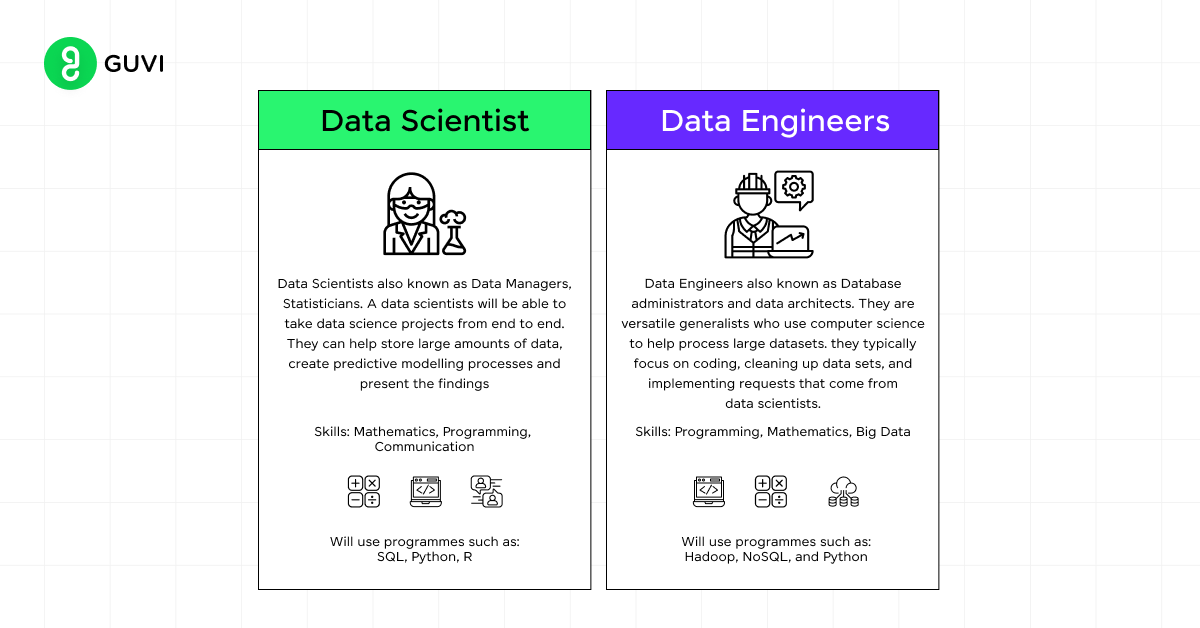
Data Science is all about making sense of large amounts of data. Imagine you have a huge pile of information, and you want to find patterns, trends, or answers hidden within it. That’s where data science comes in.
As a data scientist, you use tools like statistics, math, and programming to analyze this data. For example, you might look at sales data to predict future trends or customer behavior.
Data Engineering, on the other hand, is all about building systems that allow data to be collected, stored, and processed efficiently.
As a data engineer, you create the infrastructure that allows data to flow smoothly from one place to another, ensuring it’s clean, organized, and ready for analysis. You’re the person making sure that all the data is in the right place and in the right format so that data scientists can do their job without any hiccups.
Is There a Difference Between Data Science and Data Engineering?
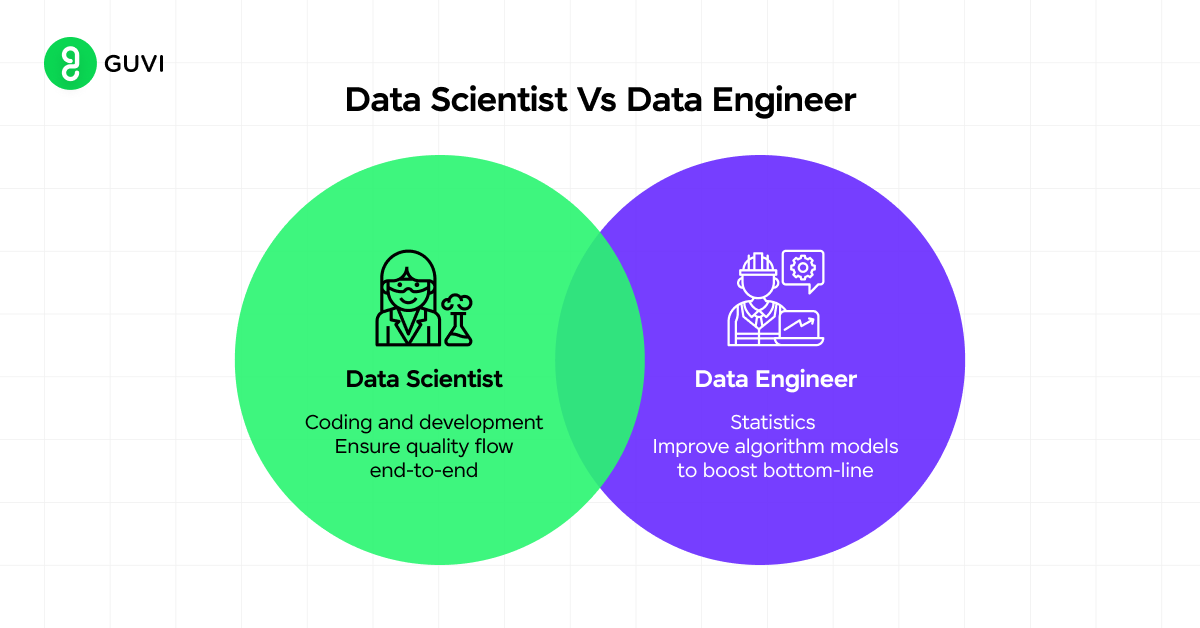
Back in the day, data scientists used to perform some of the duties of data engineers. However, as the field of data has grown and evolved, businesses now seek more intricate analysis and insights from the data gathered, and the roles have become more distinct and that’s where the division between these two domains came into the picture.
Today, data scientists are responsible for analyzing data to predict trends, extracting insights, and harnessing data to drive business decisions. On the other hand, data engineers are tasked with building robust data systems and organizing data gathered by data scientists.
Before we move into the next section, If you’re interested in pursuing a lucrative professional future, gain data science essentials like Python, MongoDB, Pandas, NumPy, Tableau & PowerBI Data Methods. Join GUVI’s Big Data and Cloud Analytics Course with placement assistance. You’ll also learn about the trending tools and technologies and work on some real-time projects.
Data Science vs. Data Engineering: Roles and Responsibilities
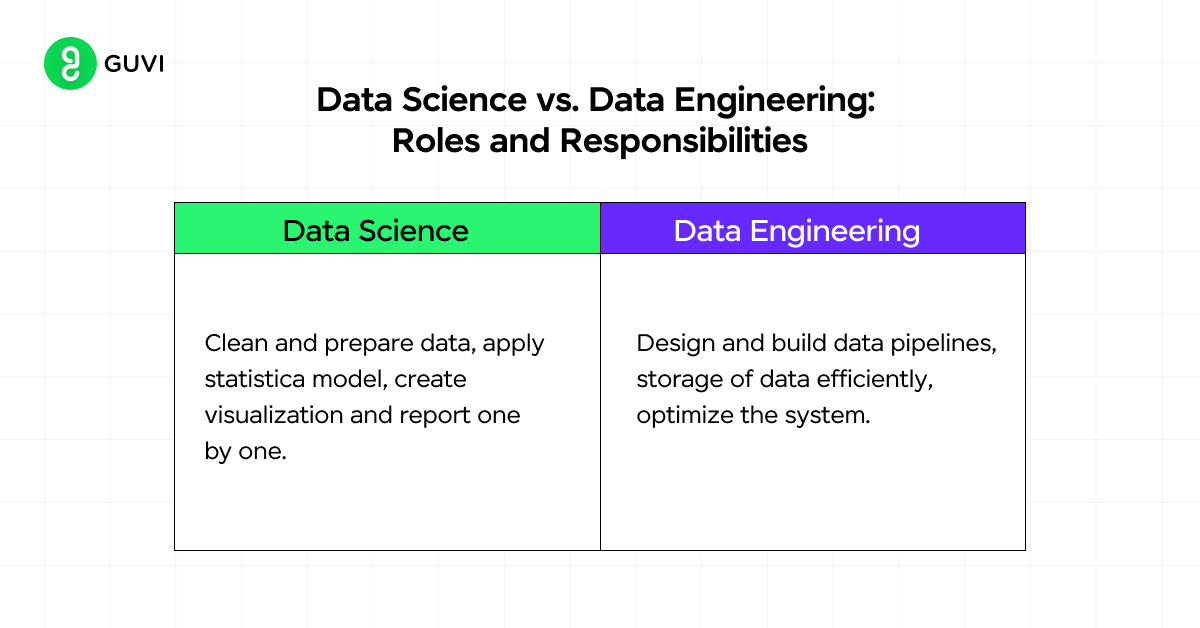
The roles of data engineers and data scientists overlap to some extent, especially in terms of the tools and technologies they use. However, a data engineer’s primary focus is setting up and maintaining data infrastructure, ensuring data is available, reliable, and ready for analysis.
On the other hand, data scientists work with processed data provided by data engineers to derive patterns, predictions, and actionable insights for businesses.
What Does a Data Scientist Do?
Data scientists play a crucial role in eCommerce, finance, and healthcare sectors. They are responsible for decoding complex data to predict consumer trends and derive actionable business insights. Their role mainly focuses on:
- Cleaning and preparing data so it’s ready for analysis.
- Applying statistical models and machine learning algorithms to find patterns or make predictions.
- Creating visualizations and reports that make complex data easy to understand.
To accomplish these tasks, data scientists rely on tools and languages like Python, R, and SQL and heavily utilize data visualization, analytics, and machine learning algorithms.
What Does a Data Engineer Do?
Data engineers are critical for creating the foundation for analysis. Their responsibilities include managing and optimizing data pipelines, ensuring seamless data flow, and making data readily available.
Now, if you’re in Data Engineering, your job is all about building the infrastructure that allows data to flow smoothly. Here’s what you’ll typically do:
- Design and build data pipelines that collect and process data from different sources.
- Ensure data is stored efficiently in databases or data warehouses.
- Optimize the system so data is easily accessible to data scientists and other stakeholders.
In India’s growing startup ecosystem, data engineers have become increasingly important in integrating various data sources, managing big data technologies, and ensuring data scalability and security.
Data Science vs. Data Engineering: Skillsets Required
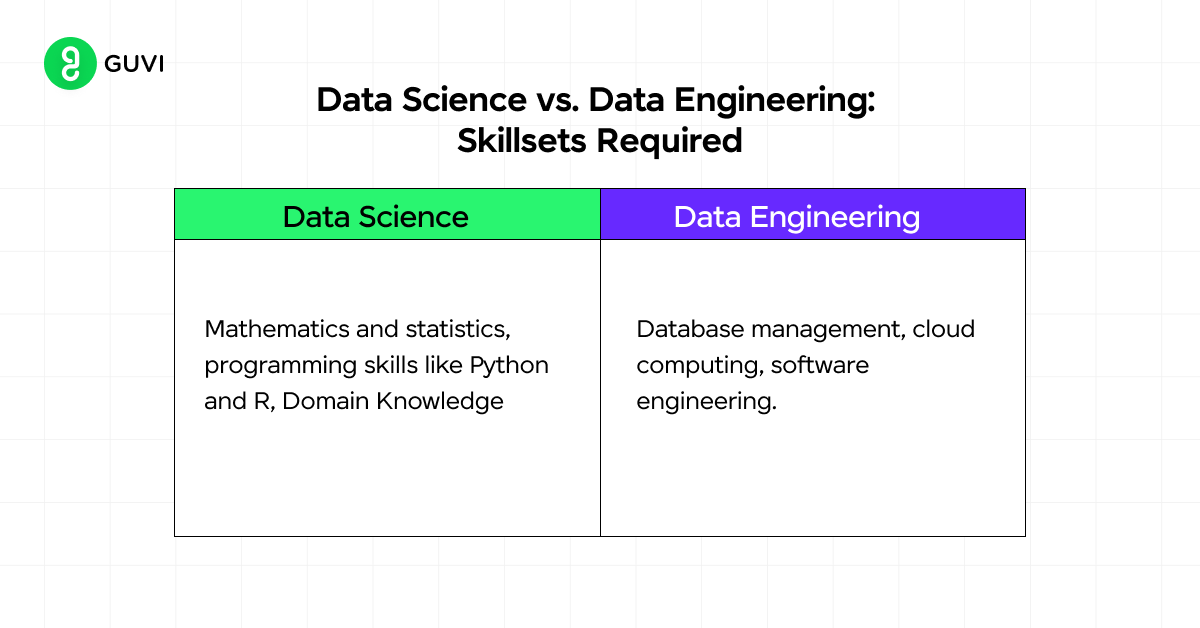
The skillsets required for data science and data engineering in India is diverse. Let us have a look at what skills a data engineer and a data scientist should possess:
Skillsets Required to Become a Data Scientist:
When it comes to data science roles in India, candidates often come from backgrounds like computer science, statistics, or even physics. The detailed skillset requirements are as follows:
- Mathematics and Statistics: You need to be comfortable with concepts like probability, linear algebra, and statistical analysis because they form the backbone of data science.
- Programming Skills: Languages like Python and R are essential, as you’ll be writing code to analyze data and build machine learning models.
- Domain Knowledge: Understanding the industry you’re working in, whether it’s finance, healthcare, or marketing, can give you an edge in applying data science effectively.
Skillsets Required to Become a Data Scientist:
To become a data engineer in India, your skills should lean more toward software engineering and computer science. Here’s what you’ll need:
- Programming and Software Engineering: You’ll need to be proficient in languages like Java, Scala, or SQL, as your role involves building and maintaining data pipelines and systems.
- Database Management: Understanding how to design and optimize databases is crucial because you’ll be working with large volumes of data.
- Cloud Computing: Familiarity with cloud platforms like AWS, Google Cloud, or Azure is often important since many data systems are now cloud-based.
Data Scientist vs. Data Engineer: Salary Differences
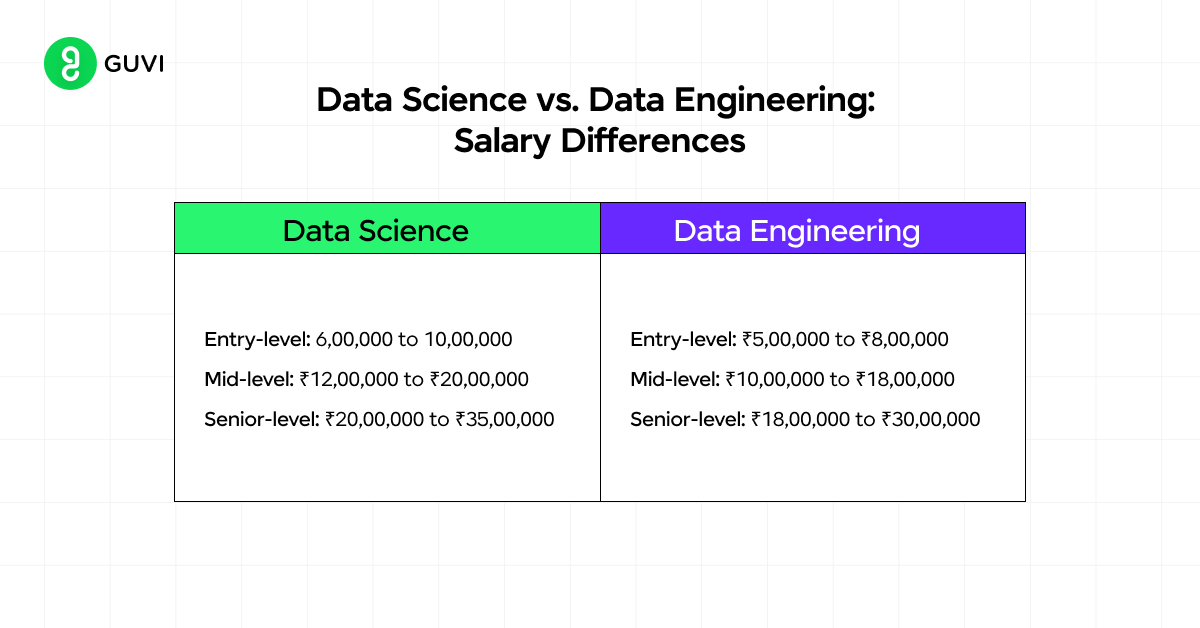
The salaries for both data scientists and data engineers are competitive in India, especially in tech hubs like Bengaluru. However, it all depends on your experience and ability to upskill yourself constantly.
| Experience Level | Years of Experience Needed | Salary of Data Scientist | Salary of Data Engineer |
| Entry-Level | 1-3 years of experience | ₹6,00,000 to ₹10,00,000 per annum | ₹5,00,000 to ₹8,00,000 per annum |
| Mid-Level | 3-7 years of experience | ₹12,00,000 to ₹20,00,000 per annum | ₹10,00,000 to ₹18,00,000 per annum. |
| Senior-Level | Over 7 years of experience | ₹20,00,000 to ₹35,00,000 per annum | ₹18,00,000 to ₹30,00,000 per annum |
Location plays a significant role in salary differences. For instance, in tech hubs like Bangalore, the salaries for both data scientists and data engineers are generally higher due to the concentration of tech companies and startups. On the other hand, smaller cities or non-metro locations might offer slightly lower salaries but still provide good opportunities.
Data Science vs. Data Engineering: Career Paths
There is no established path to becoming a data scientist or a data engineer in India. Many professionals transition from related fields, leveraging their skills and upskilling when necessary.
Let’s discuss some common ways professionals have navigated the field to get their dream jobs.
What’s a Typical Career Path for a Data Scientist?
A lot of data scientists begin their journey in starter roles, like internships or positions as junior data scientists. These first jobs let them polish their skills while working on tasks given to them. Over time, they get to take on bigger challenges and design their own experiments.
A popular path to becoming a data scientist is starting as a data analyst. After gaining some experience and learning more, analysts often shift into data science roles. This can happen by self-learning or through online courses.
What’s a Typical Career Path for a Data Engineer?
Most professionals don’t start their careers directly as data engineers. Instead, they often begin in areas like software engineering or roles that deal with data and systems, like database developers or systems analysts. These positions help them get familiar with the important tools and systems used in data science.
As they gather more experience, they dive deeper into specialized roles like data architect or solutions architect. These jobs help them sharpen their skills, understand data better, and learn about cloud computing. Some even spend time in data analytics to learn what data experts need.
General Comparison Between Data Science and Data Engineering
You have seen the key differences between data science and data engineering in detail in the above sections, now it is time to see the other key differences:
| Aspect | Data Science | Data Engineering |
| Primary Focus | Analyzing data to extract insights and build predictive models. | Building and maintaining the data infrastructure for data flow and accessibility. |
| Tools Used | Python, R, TensorFlow, PyTorch, Jupyter Notebooks | SQL, Apache Kafka, Hadoop, Snowflake, AWS, Google Cloud |
| End Goal | To provide actionable insights and predictions based on data. | To ensure data is reliable, scalable, and efficiently processed. |
| Typical Output | Predictive models, recommendations, and analytical reports. | Data pipelines, databases, and data warehouses. |
| Focus on Data Lifecycle | Analyzing and interpreting data to derive insights and predictions. | Creating, maintaining, and managing the data infrastructure. |
| Nature of Work | Involves heavy use of statistical analysis, machine learning, and modeling. | Involves building data pipelines, and databases, and managing data storage. |
| Collaboration | Works closely with data engineers to access and analyze clean, structured data. | Supports data scientists by providing well-structured and accessible data. |
| Job Roles | Data Scientist, Machine Learning Engineer, Data Analyst. | Data Engineer, ETL Developer, Database Architect. |
This table offers a clear, side-by-side comparison of the key differences between Data Science and Data Engineering, helping you quickly grasp their distinct roles and responsibilities.
Can a Data Engineer Become a Data Scientist or Vice-Versa?
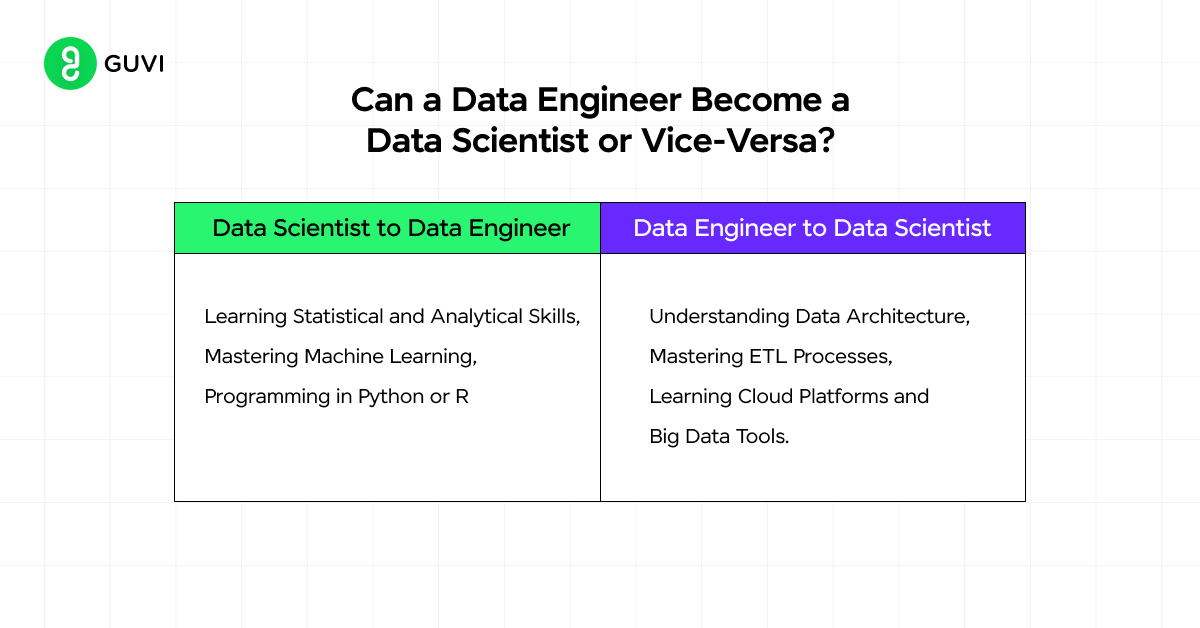
Yes, a Data Engineer can become a Data Scientist, and vice-versa, but it requires gaining additional skills and knowledge specific to the other role. Both fields are closely related, so transitioning between them is possible, especially if you have a strong foundation in data and technology.
From Data Engineer to Data Scientist:
If you’re a Data Engineer looking to transition into Data Science, here’s what you might need to focus on:
- Learning Statistical and Analytical Skills: Data Science relies heavily on statistics, probability, and data analysis. You’ll need to get comfortable with these concepts, which may not be a primary focus in your data engineering role.
- Mastering Machine Learning: Machine learning is a core component of Data Science. You’ll need to understand various algorithms, how they work, and how to apply them to real-world data problems.
- Programming in Python or R: While Data Engineers often use languages like SQL, Java, or Scala, Data Scientists typically use Python or R for data analysis and building models. If you’re not already familiar with these languages, you’ll need to learn them.
If you are looking to shift your career to data science, consider enrolling in GUVI’s Big Data and Cloud Analytics which teaches you everything about data science from scratch and you will even gain an industry-grade certification.
From Data Scientist to Data Engineer:
On the other hand, if you’re a Data Scientist interested in becoming a Data Engineer, you’ll need to acquire different skills:
- Understanding Data Architecture: Data Engineers focus on building and maintaining the infrastructure for data collection, storage, and processing. You’ll need to learn about databases, data warehouses, and data pipeline architecture.
- Mastering ETL Processes: ETL (Extract, Transform, Load) is crucial in Data Engineering. You’ll need to become proficient in designing and implementing ETL pipelines to move and transform data across systems.
- Learning Cloud Platforms and Big Data Tools: Data Engineers often work with cloud platforms (like AWS, Google Cloud, or Azure) and big data technologies (like Hadoop or Apache Spark). Gaining expertise in these tools is essential for the transition.
How to Make the Transition:
- Education and Courses: Consider taking courses or certifications specific to the skills you need. For example, you can find online courses on platforms like GUVI, Coursera, edX, or Udacity that focus on machine learning, data analysis, or data engineering.
- Hands-on Projects: Work on projects that allow you to apply the skills you’re learning. If you’re a data engineer, try building and deploying a machine-learning model. If you’re a data scientist, practice setting up data pipelines or managing data storage.
- Collaboration and Networking: Collaborating with colleagues in the other role can help you gain practical insights. Networking with professionals in both fields can also provide guidance and open up opportunities for career transitions.
While the transition between Data Engineering and Data Science is possible, it requires dedication to learning new skills and understanding the nuances of the other role. With the right effort and resources, you can successfully make the switch and expand your career opportunities.
In case you are looking to start a career or shift into data engineering, a professionally certified Big Data and Cloud Analytics Course can help you get it done in the right way!
Conclusion
In conclusion, the demand for data scientists and data engineers is equally on the rise. Although both roles overlap to an extent, they serve distinct functions. Data scientists analyze data to predict trends, extract insights, and drive business decisions. While data engineers, on the other hand, build robust data systems and organize data for analysis.
If you’re considering choosing between the two, reflect on your strengths and passions. Data science may be your path if you have an analytical mind and are curious about patterns and insights. However, if building, optimizing, and ensuring data flows seamlessly is your forte, data engineering may be the perfect fit.
FAQs
No, data science focuses on analyzing and interpreting complex data to derive insights, while data engineering centers on building and maintaining the data storage and processing infrastructure.
It depends on individual interests. Data science is ideal for those interested in insights and predictions, while data engineering is for those keen on building robust data systems.
Both data science and data engineering have their complexities. Data engineering requires expertise in systems and infrastructure, while data science demands strong analytical skills and knowledge of algorithms.
Both data science and data engineering have a promising future due to the increasing reliance on data-driven business decisions. As technology evolves, their roles will expand and adapt.
Data science and data engineering freshers in India can earn anywhere from ₹4 lakhs to ₹8 lakhs annually, depending on the company and location.






















![Top 10 Mistakes to Avoid in Your Data Science Career [2025] 10 data science](https://www.guvi.in/blog/wp-content/uploads/2023/05/Beginner-mistakes-in-data-science-career.webp)


Did you enjoy this article?